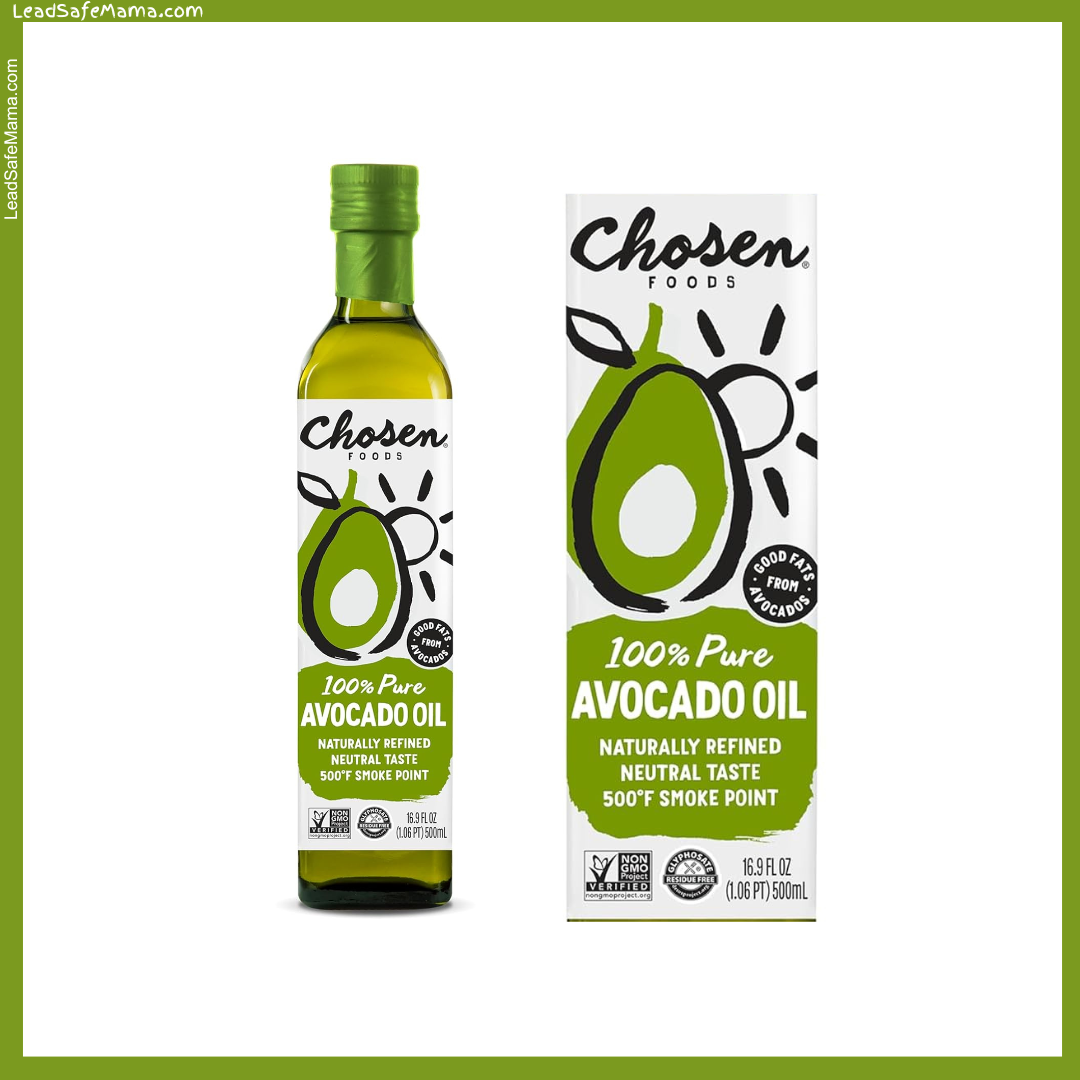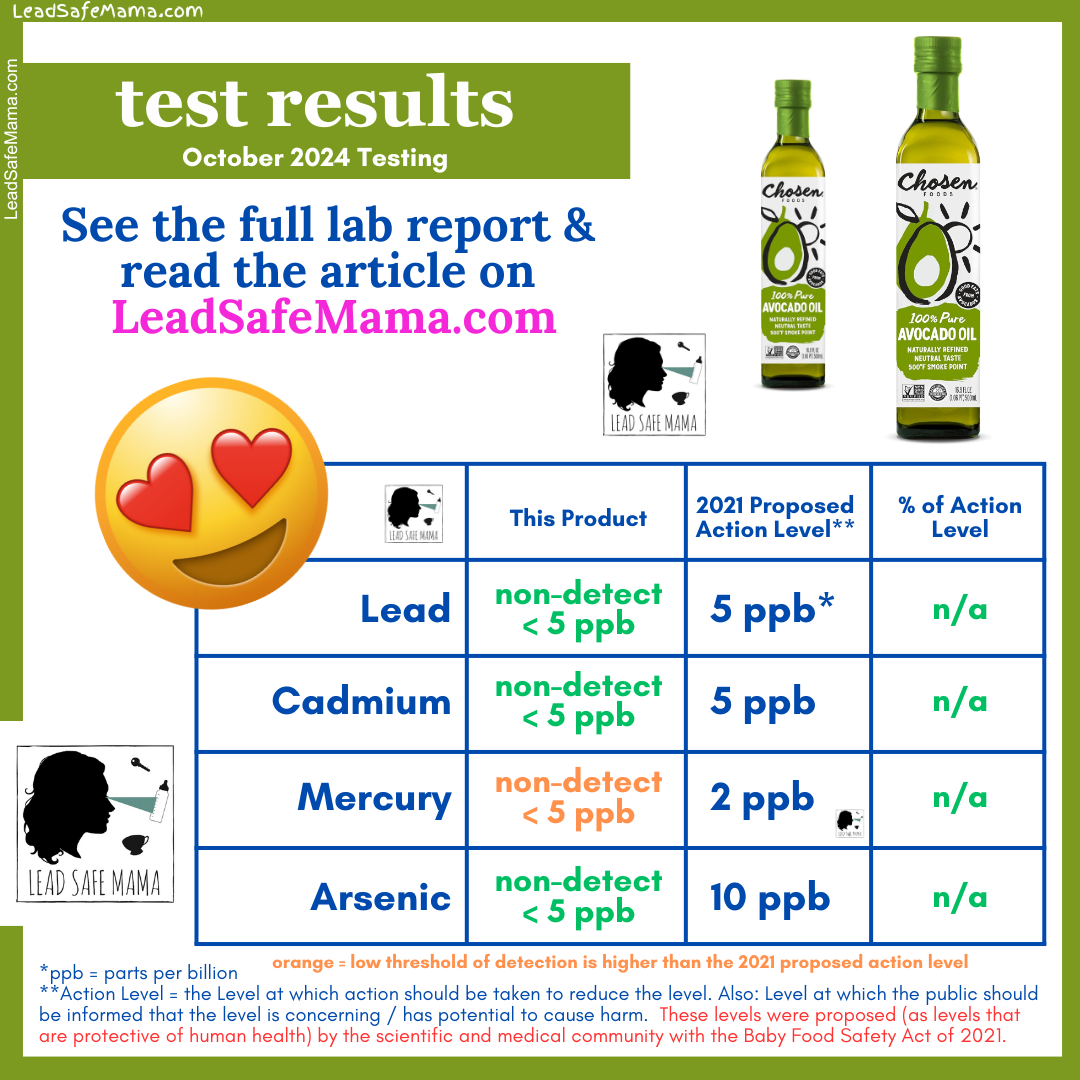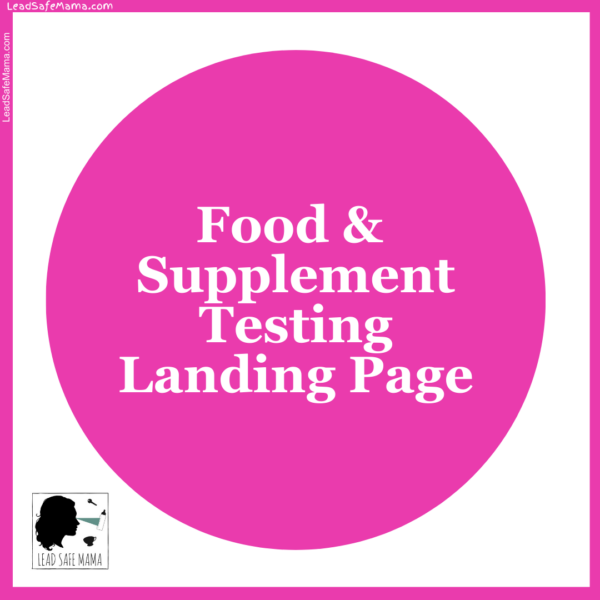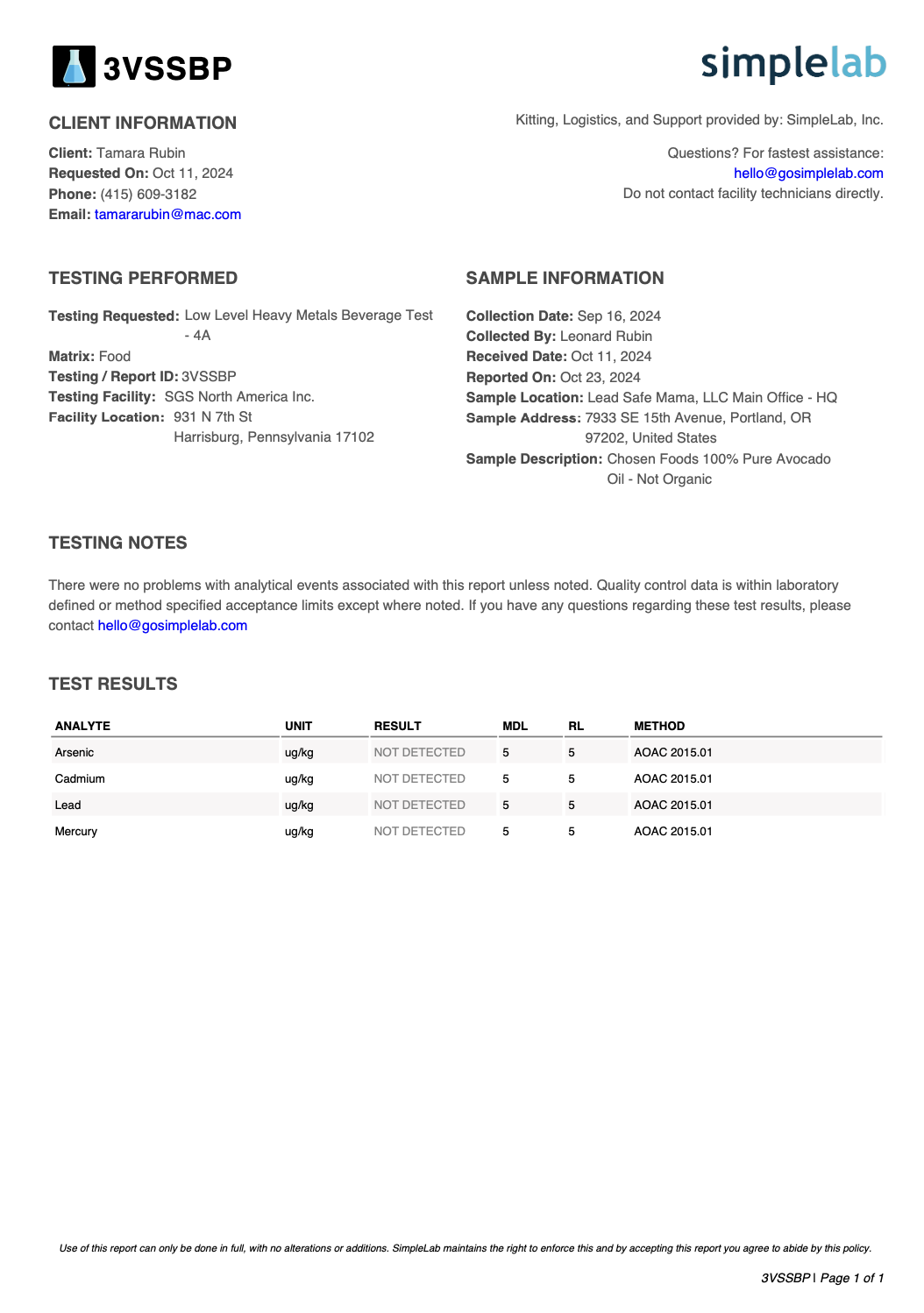October 2024 Laboratory Test Report for Chosen Foods 100% Pure Avocado Oil (Not Organic)
Quick Note from Tamara Rubin:
Hi all! This product tested “non-detect” for Lead, Cadmium, Mercury, and Arsenic! This is interesting given the organic version of this product from the same brand tested positive for traces of Arsenic (you can find that lab report here). The lab report for the product pictured above — the non-organic version of this oil — (which includes the low thresholds of detection for the testing completed) can be found at the bottom of this page. Here’s an affiliate link for this product if you would like to support this work with your purchases (thank you!): https://amzn.to/3YDZSuv
For those new to the Lead Safe Mama website:
Tamara Rubin is a multiple-federal-award-winning independent advocate for childhood Lead poisoning prevention and consumer goods safety, and a documentary filmmaker. She is also a mother of Lead-poisoned children (two of her four sons were acutely Lead-poisoned in 2005).
- Tamara owns and runs Lead Safe Mama, LLC — a unique community collaborative woman-owned small business for childhood Lead poisoning prevention and consumer goods safety.
- Since July of 2022, the work of Lead Safe Mama, LLC has been responsible for six product recalls (FDA and CPSC).
- All test results reported on this website are science-based, accurate, and replicable.
- Please check out our press page to see some of the news coverage of our work – link here.
This is an ad-free article.
Advertising and affiliate income help Lead Safe Mama, LLC cover the costs of the work we do here (independent consumer goods testing and childhood Lead poisoning prevention advocacy). We have removed ads from most of our more widely-read articles (and newly published articles, too — like this one!) to make them easier for you to read. In addition to supporting this work by starting any shopping you might be doing online with a click on our affiliate links, if you would like to support the independent consumer goods testing and childhood Lead poisoning prevention advocacy work of Lead Safe Mama, LLC by making a contribution (which will also help us keep our more widely-read articles ad-free), click here. Thank you!
Considerations:
- While the low threshold of detection for Mercury for this particular lab report is higher than the 2021 proposed Action Level (see that number in orange above), given the ingredient profile of this product, we do not have a concern for Mercury contamination.
- Said another way, it is highly unlikely there is trace Mercury in this product at levels in the single digit ppb range.
- As this is a “Non-Detect For All” product we are adding to our safer choices list (below), we will be testing this again periodically to confirm the results are consistent (twice or more times per year).
- If we find a reliable lab that consistently tests down to lower thresholds of detection for Mercury, we will use that lab for any subsequent/ future testing.
- We are very happy with this result across the board and consider this a product that is safe for the youngest members of our society (from a heavy metals perspective)!
Important Background: What is an Action Level?
Please note the following key points:
The original lab report for this product is below (at the bottom of this page).
The graphic above shows the levels of metals detected in this product (in red) along with the low threshold of detection (in orange, above the action levels discussed/ or in green, below the action levels discussed) for each metal not detected with the laboratory testing Lead Safe Mama, LLC had completed for this product. The numbers are juxtaposed (in blue) to the “Action Level” proposed by the medical and scientific community in 2021 as part of the Baby Food Safety Act. For this round of testing, SimpleLab (our laboratory testing provider) had a change of labs and their low threshold of detection is slightly higher than in previous testing rounds.
- These 2021 levels were proposed as “Action Levels” because they are (in fact) protective of human health.
- An “Action Level” is NOT the same as a “Maximum Allowable Level.”
- Many food manufacturers misinterpret guidance on heavy metals to mean “allowable levels” and consider it reasonable for their products to test positive below these levels.
- This is a (perhaps intentional?) misunderstanding/ misinterpretation the food industry makes — a misunderstanding that food manufacturers use to justify the presence of heavy metals in products.
- Heavy metals accumulate in the body.
- It is the cumulative/ aggregate impact of heavy metal exposure (over a lifetime) that makes even small/ incidental/ seemingly trivial exposures particularly damaging and dangerous. You can read more about that here.
- Once a food product has the amount of heavy metal (Lead, Cadmium, Mercury, or Arsenic) noted (above) as the “Action Level,” that product is officially considered (by the scientific and medical community) unsafe for consumption by children as toxicants (found at-or-above these levels) are in the range of heavy metal levels that have been demonstrated to cause lasting harm.
- Action Levels are unrelated to serving size.
- Action Levels are relevant for any amount of a food product that may be consumed (any quantity of the food in question).
- PPB (parts per billion/ ppb) measurements are a percentage (albeit a very small percentage) and apply to any quantity of the food product tested.
- For more discussion about serving size considerations (and why relying on “serving size” to limit toxicant exposure is not a relevant metric/ not a metric protective of human health), read this article.
- These “Action Levels” proposed in 2021 are the levels at which the scientific and medical community believe the manufacturer (or government) needs to take ACTION to fix the problem.
- One “Action” would be for the manufacturer to take steps to reduce the levels of toxicants in the food product.
- Another “Action” would be for the manufacturer to cease sales of the product until the product could be made safe.
- Another “Action” would be for the manufacturer to inform the public that a specific food product has an unsafe level of the metal detected at-or-above the “Action Level” — making a highly-visible public announcement regarding which relevant batches of the product should be recalled/ no longer consumed.
- The Action Levels proposed with the Baby Food Safety Act of 2021 were not arbitrary toxicant levels, but were proposed because they are the levels most protective of human health. However, the Baby Food Safety Act of 2021 was not passed into law.
- Regardless of the fact the Baby Food Safety Act of 2021 never passed into law — and it is therefore legal to have foods and supplements marketed for consumption by children test positive for Lead, Cadmium, Mercury, and Arsenic at-or-above these levels — these Action Levels still reflect the current (modern/ relevant) advice of the medical and scientific communities as levels both achievable by the industry and safeguards of infant and toddler health.
- Food industry lobbyists fought against formalizing these proposed “Action Levels” as a government standard, alleging the levels were unachievable.
- The list of safer choices (below, including this product) clearly demonstrate these Action Levels as achievable across a range of food types (salt, flour, coffee, oatmeal, chia seeds, hemp seeds, soy milk, packaged fruit-based snacks, beverages, and more).
- The legitimacy of these levels as “Action Levels”/ “Levels of Concern” (even though they were not adopted as law) is mirrored by the legitimacy of the American Academy of Pediatrics’ level of concern for Lead in water, which is 1 ppb despite the FDA’s official “level of concern” for Lead in water being 15 ppb (you can read more about that here).
“Simply Not Achievable”
To reiterate: While the packaged, processed food industry would have consumers (and the government) believe the standards proposed in 2021 are unachievable, this industry position (an oft-rearticulated response to nearly every set of laboratory test results for food and supplements that we have published to date) is simply not true.
It is possible to make safer processed, packaged food products and supplements that fall well below the safety limits for toxicants proposed within the Baby Food Safety Act of 2021. To wit, the products listed below (the first section of the list below) tested “non-detect” for Lead, Cadmium, Mercury, and Arsenic — several even tested non-detect for Lead with the low threshold of detection being “less than 1.5 ppb.”
Below is an EXPANDING list of products (foods and supplements) that have tested “non-detect” for Lead, Mercury, Cadmium, and Arsenic with independent, third-party, crowd-funded laboratory testing coordinated by Lead Safe Mama, LLC (an Oregon-based small business with a unique community-collaborative business model and a focus on consumer goods safety and childhood Lead poisoning prevention).
–
The limits of detection for each of the metals tested are noted in the lab report for the specific product listed. To see the full lab report for any of these products, type the brand name into the search bar at the top of any page on Lead Safe Mama dot com (and scroll down to the bottom of the related article).
–
Flavors tested are noted, and other flavors of the same product (or other products from the same brand) have either not been tested or have been tested but did not yield similar results. Test results only apply to the specific products linked below.
LIST UPDATED November 26, 2024:
- Beverage — Olipop Grape Tonic: https://amzn.to/4cjFYZu
- Breakfast Item — 1 — Nature’s Path Envirokidz Organic Panda Puffs: https://amzn.to/4fo1crf
- Breakfast Item — 2 — One Degree Organic, Gluten-Free, Sprouted Rolled Oats (Canada): https://amzn.to/3WIQ1BN
- Candy — Cavendish & Harvey Wild Berry Drops, not Organic (Germany): https://amzn.to/3Z1Jxjr
- Coffee — 1 — Chameleon Handcrafted Organic Cold Brew Concentrate: https://amzn.to/3OcrH77
- Coffee — 2 — Death Wish Organic Espresso Roast Ground Coffee (Multi-country Origin, non-USA): https://amzn.to/3yo1eiL
- Plant-Based Coffee Creamer — 1 — Laird Superfood Coconut Creamer: https://amzn.to/4fItA7A
- Dairy Coffee Creamer — 2 — Organic Valley Grassmilk Half and Half: https://amzn.to/4fHJIWT
- Fruit Snack — 1 — GoGo Squeez Organic Apple Sauce Pouch: https://amzn.to/3XhWYLe
- Fruit Snack — 2 — Pure Organic Layered Fruit Bars in Strawberry Banana Flavor: https://amzn.to/3WQEekA
- Fruit Snack — 3 — Once Upon A Farm Dairy Free Fruit Smoothie Pouch in Strawberry Banana Swirl Flavor: https://amzn.to/3CPMbAw
- Fruit Snack — 4 — Pure Organic Layered Fruit Bars in Raspberry Lemonade Flavor: https://amzn.to/3XcFsIp
- Infant Formula — 1 — Bobbie Organic Gentle Infant Formula Milk-Based Powder with Iron: https://amzn.to/3YYb849
- Infant Formula — 2 — Bobbie Grass-Fed Milk-Based Powder with Iron: https://amzn.to/3ZlAaeJ
- Infant Formula — 3 — ByHeart Infant Formula (USA-Made, not organic): https://amzn.to/48DJjTb
- Infant Formula — 4 — HiPP Bio Combiotik Infant Formula Powder – Stage 1 (imported)
- Infant Formula — 5 — Holle Bio Goat Stage 2 Infant Formula (for 6-10 months, organic, European — Swiss/ German/ Austrian) is not available on Amazon, but the Stage 3 version of this product is (not yet tested, but will likely test similarly): https://amzn.to/3BVU7zI
- Infant Formula — 6 — Kendamil Goat Infant Formula (not organic): This product may be available at Target (it is not available on Amazon)
- Infant Formula — 7 — Kendamil Organic Follow-On Milk (European/ British Toddler Formula, for 6-12 months, Cow Milk): Not available on Amazon (report link)
- Infant Formula — 8 — Kendamil Organic Infant Formula (Cow Milk): Not available on Amazon but may be available at Target
- Ingredient — 1 (salt) — Jacobsen’s Sea Salt (Oregon, USA): https://amzn.to/4dcbk5L
- Ingredient — 2 (baking flour) — Jovial Organic Einkorn Flour (Italy): https://amzn.to/3LIqxix
- Ingredient — 3 (seeds) — Costco Kirkland Organic Hemp Seeds: https://amzn.to/4e05RP9
- Ingredient — 4 (seeds) — Navitas Organic, Gluten-Free Chia Seeds (Mexico): https://amzn.to/3YvE7xC
- Oil — 1 — Chosen Foods 100% Avocado Oil (not organic): https://amzn.to/3YDZSuv
- Oil — 2 — Dr. Adorable’s Organic Perilla Seed Oil (Korea): https://amzn.to/3NDt7Yc
- Plant-Based Milk — 1 — Kiki Milk Organic Plant Based Milk (original flavor): https://amzn.to/3AA6Qrt
- Plant-Based Milk — 2 — West Soy Unflavored Unsweetened Organic Soy Milk: https://amzn.to/4dwev8l
- Supplement — 1 — Nordic Naturals Omega-3 Fish Oil: https://amzn.to/48q1j2V
- Supplement — 2 — Mary Ruth’s Organic Toddler Multivitamin Liquid Drops with Iron: https://amzn.to/3YPhcgx
Stand by for more!
–
BONUS FOUR: Below are FOUR additional products that each tested positive for trace (very low levels of) Arsenic — including the product featured above in this report — at levels considered safe by all standards (with the limits of detection noted in the lab report for the specific product listed):
- Infant Formula — Kendamil Goat Toddler Milk, not Organic (positive for traces of Arsenic): May be available at Target or through other online retailers of European infant formulas
- Fruit Snack — That’s It Apple Cherry Bars, not Organic (positive for traces of Arsenic): https://amzn.to/4fHkSWV
- Oil — Chosen Foods 100% Pure Avocado Oil — Organic (postive for traces of Arsenic): https://amzn.to/3BVQYQa
- Supplement — Now Sunflower Lecithin, not Organic (positive for traces of Arsenic): https://amzn.to/3AFdHzO
Amazon links are affiliate links.
Published: October 26, 2024
Saturday
Hello! We are working on publishing a LOT of test results very quickly this month.
We will be updating this section of each article (with more information about the specific product and other similar products for context) as time permits, but we wanted to make sure the greater Lead Safe Mama community (and the general public) had access to this scientific data (about foods and supplements in their home) as quickly as possible.
Please scroll down to see the full laboratory test report for the product pictured above. Thank you for your patience.
As there are almost no reasonable safety thresholds proposed for toxicants (heavy metals) consumed by adults (in foods and supplements), our focus is (as always) on the health of children. The available proposed safety thresholds (and guidance) for foods consumed by adults are not set at levels protective of human health and are therefore irrelevant to the work we do here at Lead Safe Mama, LLC.
This is the Lead Safe Mama Amazon affiliate link to purchase a test kit similar to what we use for our laboratory testing.
To see more articles related to the laboratory testing for foods and supplements Lead Safe Mama, LLC is hosting (including background on this initiative and safer food choices and guidelines), click the pink square below. To see the full, independent, third-party, laboratory report for the product pictured above, please scroll down to the bottom of this page.
Amazon links are affiliate links. If you purchase something after clicking on a Lead Safe Mama, LLC Amazon affiliate link, Lead Safe Mama, LLC may receive a percentage of what you spend — at no extra cost to you.
Lab report for the product pictured above:
Never Miss an Important Article Again!
Join our Email List











Did you know Chosen Avocado oil was tested for Phthalates and came in at: — Total phthalate 1,130 ppb. Intermediate high contamination.
Our work is focused on heavy metals and we always share the actual lab report with our laboratory testing results. I would encourage readers to ask for the lab report for any additional testing they have concerns about (I don’t believe the lab report for the specifics you are mentioning has been made public).
T
Yes it has been made public by [redacted].
Hi Nancy,
I don’t believe the source you cited made the actual lab report public. I believe they published a summary of test results, but I have not been made aware of any actual lab reports that have been made public by that organization. It is for this reason that we redact the name, as we have not been able to confirm much of the data they publish.
Tamara
Ok but what about for the organic version? I think this was only for the non-organic version. Would love testing done on that.
Test results for the organic version are also here on the website. Click the AVOCADO OIL hyperlink tab at the top of this article or search for AVOCADO OIL using the search bar that is at the top of every page of the website. You can also find products on the landing page which links all of our published lab reports, organized by category: https://tamararubin.com/lab-reports/
I wonder how the green glass test with xrf on chosen avacodo oil